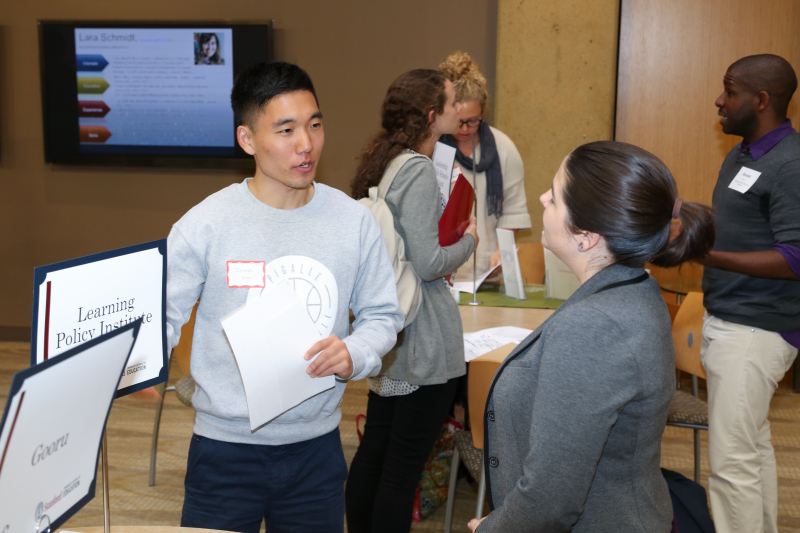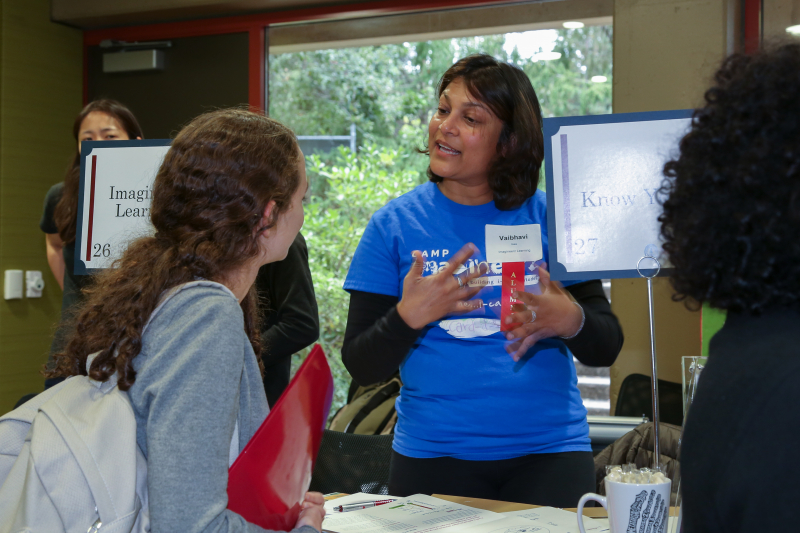In addition to assisting students with their permanent job search, EdCareers also helps provide a bridge between students and employers for valuable experiential learning.

Master of science students in the Education Data Science (EDS) program and the Learning Design and Technology (LDT) program, and Master of arts students in the Policy, Organization, and Leadership Studies (POLS) program complete required experiential learning as an integral part of their program. Students in our joint master’s programs–MA/MBA, MA/MPP, and MA/JD–may integrate experiential learning and internships in keeping with their academic interests and professional goals.
| Education Data Science (MS) | Internship | 6-10 hours/week* | One quarter |
| Learning Design and Technology (MS) | Internship | 6-10 hours/week** | Two quarters |
| Policy, Organization, and Leadership Studies (MA) | Field Project | 150 hours total | Two quarters (winter & spring) |
*may work up to 40 hours/week during the summer quarter
**may work up to 20 hours/week during the summer quarter
| Joint MA/MBA in education and business | duration and format varies |
| Joint MA/MPP in education and public policy | duration and format varies |
| Joint MA/JD in education and law | duration and format varies |
Students find experiential learning opportunities through the EdCareers portal, through other job posting sites, and through direct contact with employers. In some cases program directors help students connect with experiential learning hosts.
Ideal experiential learning helps the student build professional skills while applying classroom concepts to projects that are “mission critical” to the host organization. EdCareers recommends no more than 10 hours per week, with student and manager meeting regularly. Experiential Learning can be paid and/or for academic credit.
For more information on what defines an internship, please visit the NACE internship guide.
International students face some extra requirements for holding internships in the U.S. The Curricular Practical Training (CPT) authorization applies to students in programs with a required internship. Optional Practical Training (OPT) is an off-campus employment benefit for employment in the major field of study. To learn more about CPT and OPT, visit the Bechtel International Center website.
* For MA/MBA students, please consult with MA/MBA director Geoff Cox (gcox@stanford.edu) if you are interested in pursuing an internship for academic credit.
** For all other graduate students, including PhDs, contact EdCareers Director Emi Kuboyama (kuboyama@stanford.edu) if you are interested in pursuing an internship.
Internship Agreements help to ensure that you and the organization that you are working with are on the same page in terms of understanding the time, resources, and outcome of expectations for your internship.
View the Internship Agreement Form here.
If have questions about internships, please contact us at edcareers@stanford.edu.

Hiring a GSE master’s student intern is a great way to gain knowledgeable contributions to your projects, bring new perspectives to your work, and support the development of emerging professionals in your field. It’s also a great way to cultivate a future recruitment pipeline for excellent, well-prepared talent.
Ideal experiential learning helps the student build professional skills while applying classroom concepts to projects that are “mission critical” to the host organization. EdCareers recommends no more than 10 hours per week, with student and manager meeting regularly. Experiential Learning can be paid and/or for academic credit.
For more information on what defines an internship, please visit the NACE internship guide.
Create an account in the EdCareers portal and complete the form to post your position. Students may apply through the portal or by emailing you directly.
Students negotiate the details of the position with their manager and submit an online internship agreement, which the manager signs.
Near the end of the quarter the student completes a self-evaluation survey, and the manager provides feedback on the student’s performance.
| Quarter | Quarter starts | Internship agreement due | Quarter ends |
|---|---|---|---|
| Fall 2024 | September 23 | October 4 | December 6 |
| Winter 2025 | January 6 | January 17 | March 14 |
| Spring 2025 | March 31 | April 12 | June 6 |
| Summer 2025 | June 23 | July 5 | August 15 |
| Fall 2025 | September 22 | October 3 | December 12 |
| Winter 2026 | January 5 | January 16 | March 22 |
| Spring 2026 | March 30 | April 10 | June 10 |
| Summer 2026 | June 22 | July 3 | August 15 |
For questions about hosting a GSE intern, please contact Alanna Simao at asimao@stanford.edu.